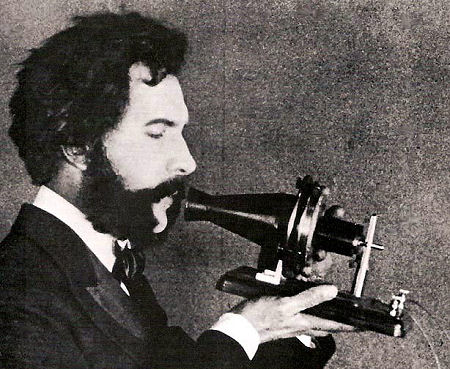 Bell Using the First Telephone Note About Image Copyright |
Alexander Graham Bell lived from 3 March 1847 to 2 August 1922. He was a scientist, inventor, and innovator. Born and brought up in Scotland, he emigrated to Canada in 1870, and moved from there to the United States in 1871. Bell is widely known for developing and patenting the telephone. He also produced important innovations in aviation and hydrofoil technology. The wider picture in Scotland at the time is set out in our Historical Timeline.
Bell was born in Edinburgh, the middle child of three boys, but both his brothers died of TB as children. His father was Professor Alexander Melville Bell, and his mother was Eliza Grace Symonds Bell. At the age of 11, the young Alexander adopted "Graham" to reflect his regard for a family friend, Alexander Graham.
The family had strong links with the teaching of speech and elocution, and Bell's father, grandfather and uncle were all elocutionists. Bell's father was also the developer of the idea of "Visible Speech", which helped the deaf read people's lips and to speak themselves. Bell's mother and his paternal grandmother were both deaf, and his father is sometimes regarded as a pioneer in the field of opening up communication for deaf people. On the other hand, he seems to have held strong prejudices against the deaf, and believed that it would be possible to eliminate hereditary deafness through eugenics.
Bell was educated at the Royal High School in Edinburgh. At the age of 16, he became a pupil-teacher of elocution and music at Weston House Academy in Elgin. The following year he attended the University of Edinburgh, and later graduated from the University College of London. From an early age, Bell was interested in acoustics, with the intention of helping his mother cope with her deafness.
In 1870, the 23 year old Alexander Graham Bell and his parents emigrated to Canada, and in the same year he became a Canadian citizen. In 1871, Bell took up a invitation - originally intended for his father - to teach the System of Visible Speech at a large school for the deaf in Boston, Massachusetts. He went on to become Professor of Vocal Physiology and Elocution at the Boston University School of Oratory.
By this time the United States had come to rely heavily on telegraph traffic and the search was on to find ways of allowing a single wire to carry more than one message at a time. Bell became one of a number of inventors to work on the problem. On 14 February 1876, Bell's lawyer filed an application with the US patent office for the telephone. Two hours later, Elisha Gray, who had been working on a parallel but closely related line of research, did likewise. Bell's patent was issued on 7 March 1876. Later in 1876, Bell offered to sell his patent outright to Western Union for $100,000. They declined and the Bell Telephone Company was formed in 1877. When Western Union tried to buy the patent for $25 million in 1878, Bell no longer wanted to sell.
Considerable controversy surrounded the granting of Bell's patent, which was later challenged by both Elisha Gray and by the Italian, Antonio Meucci, who had produced a practical design for a telephone as early as 1872 but whose design had apparently been lost by Western Union before it could be patented.
Bell went on to produce a wide range of other innovations. These included the photophone, in which sound could be transmitted over a beam of light: the forerunner of today's optical fibres. He also worked on the use of magnetic fields to record sounds on magnetised objects. Though this went nowhere at the time, it proved to be the forerunner of tape recorders and computer disks. In 1881 Bell invented the metal detector in an effort to locate the bullet in the body of US President James Garfield. The detector worked, but proved unable to help Garfield because of the metal frame on the bed he was lying on. In 1908 Bell designed the first practical hydrofoil boat. At around the same time, he was an active participant in a group exploring aeronautics whose work led to the invention of the aileron (in parallel with others). Other inventions included a detector of icebergs, a practical means of separating salt from seawater, and innovations in the use of alternative fuels.
Later in life, Bell became a prominent proponent of the principle of Eugenics, the improvement of human hereditary traits through various forms of intervention. He strongly advocated laws for the compulsory sterilisation of people deemed to be, in Bell's words, "a defective variety of the human race". By the late 1930s half the states in the USA had passed eugenics laws, with those in California being used as the basis for eugenics laws that were implemented in Nazi Germany. Despite this, Bell achievements were such that he was publicly voted by TV audiences to be among the 100 Greatest Britons in 2002, the top-ten Greatest Canadians in 2004, and the 100 Greatest Americans 2005. Bell was the only person to be included on more than one of those lists. But he was never to be aware of any of this: he died in 1922 at the age of 75.

